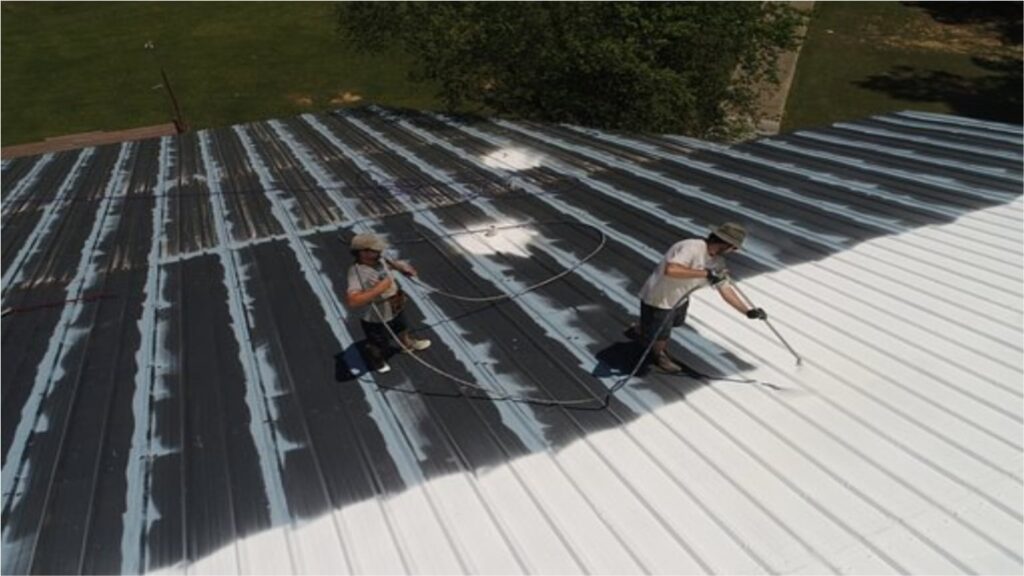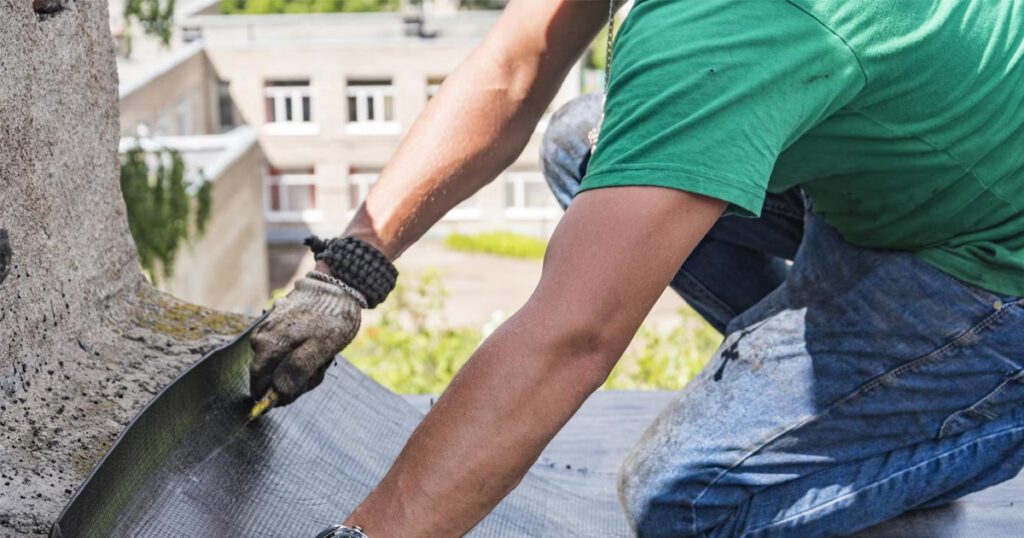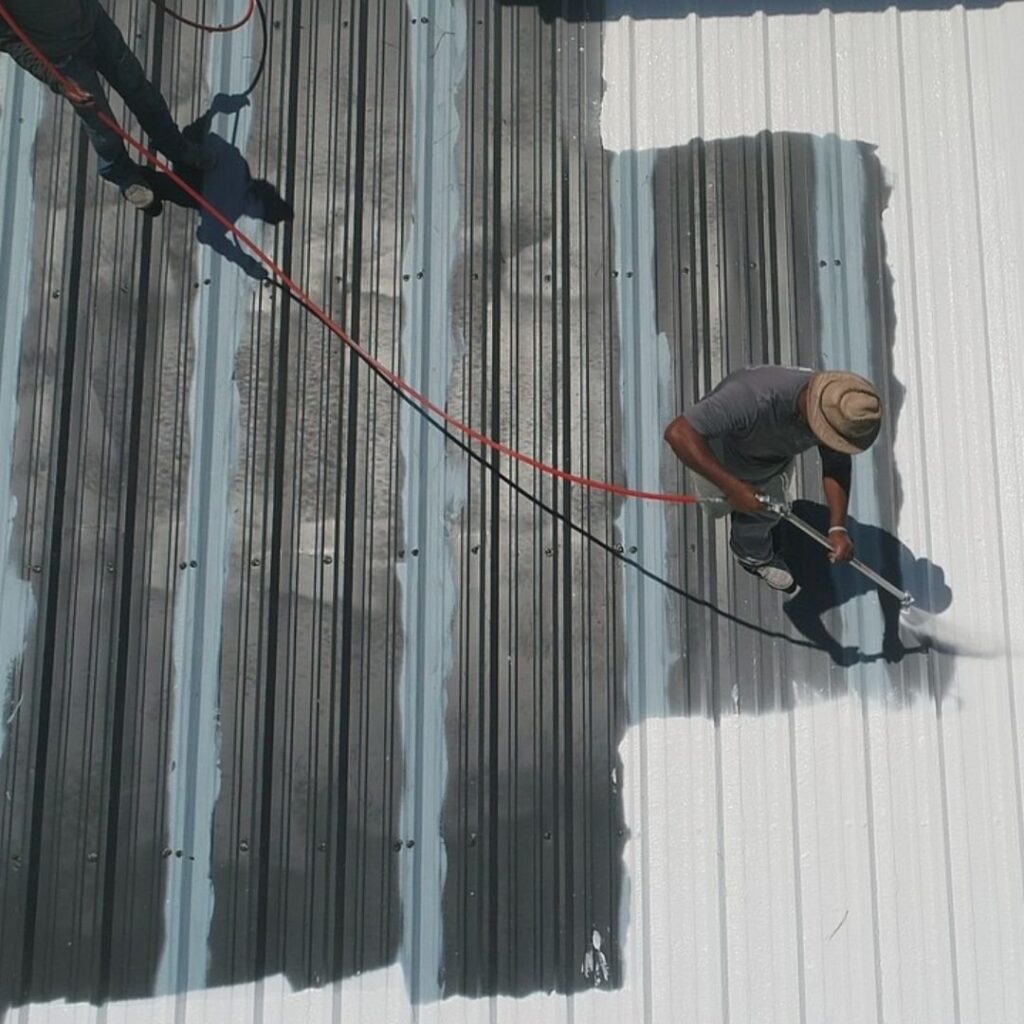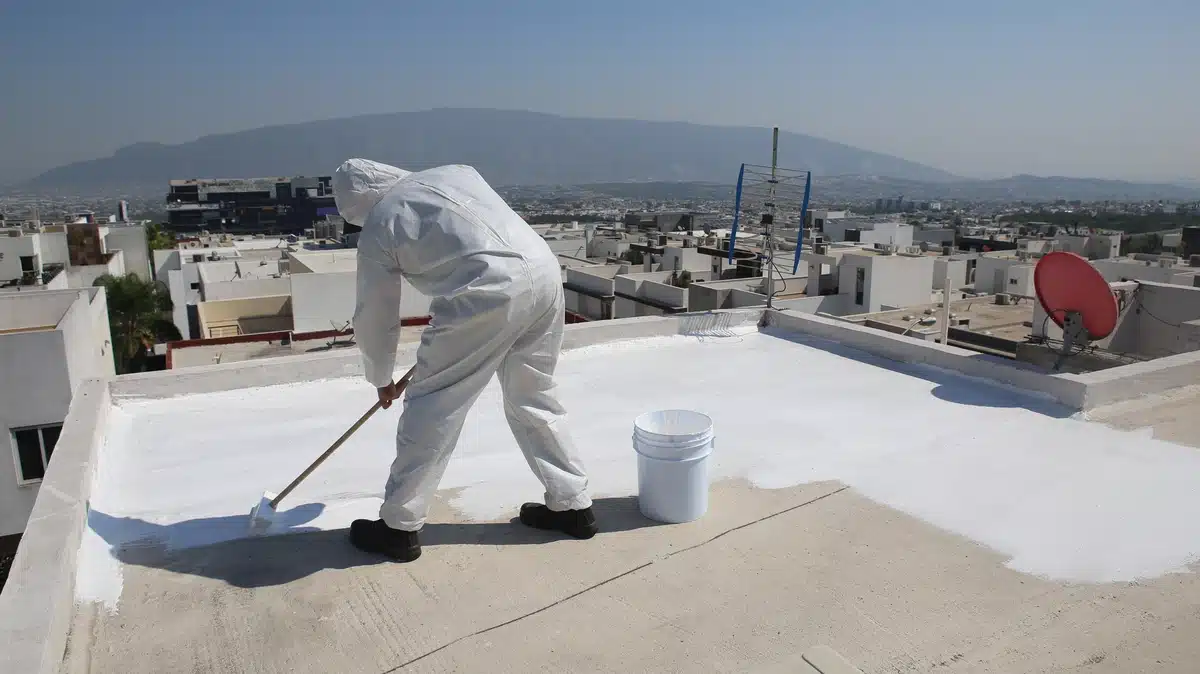Congratulations on investing in a commercial roof sealant! You made a wise choice that will not only protect your roof but also bring numerous benefits to your business. By applying a commercial roof sealant, you are providing a layer of protection against harsh weather conditions, preventing leaks, extending the lifespan of your roof, and ultimately saving money on costly repairs. Say goodbye to those pesky leaks and hello to a secure roof that can withstand the test of time.

Understanding Commercial Roof Sealant
What is Commercial Roof Sealant?
Commercial roof sealant is a type of protective coating that is applied to commercial rooftops to provide various benefits. It is specifically designed to protect the roof from the elements and extend its lifespan by preventing damage, leaks, and wear and tear. Roof sealants are available in various types, each with its own unique properties and advantages.
Types of Commercial Roof Sealants
There are several types of commercial roof sealants available, including silicone, acrylic, polyurethane, and asphalt-based sealants.
Silicone sealants are known for their durability and flexibility. They offer excellent resistance to UV radiation, temperature extremes, and water penetration. Silicone sealants are also easy to apply and maintain.
Acrylic sealants are a popular choice due to their affordability and versatility. They provide good UV resistance, waterproofing properties, and can be easily modified with additives for specific requirements.
Polyurethane sealants are known for their superior durability and strength. They offer excellent resistance to chemical exposure, impacts, and weathering. Polyurethane sealants are commonly used in high-traffic areas and areas prone to heavy weather conditions.
Asphalt-based sealants are primarily used for flat roofs. They provide good waterproofing properties and can effectively seal cracks and joints. However, they can be more susceptible to UV damage and may require additional protective coatings.
How Does Roof Sealant Work?
Roof sealants work by forming a protective barrier on the surface of the roof. They create a seamless and watertight membrane that prevents moisture from penetrating the roof and causing damage.
Sealants also provide additional benefits such as UV radiation resistance, heat reflection, and improved energy efficiency. They help to minimize the risk of leaks, reduce the wear and tear caused by weathering, and extend the lifespan of the roof.
Extended Roof Life
Roof Longevity and Sealants
One of the significant advantages of using commercial roof sealant is the extension of the roof’s lifespan. With regular exposure to the elements, commercial roofs can deteriorate over time, leading to costly repairs or premature replacements. By applying a roof sealant, you can effectively protect the roof from environmental factors such as UV radiation, rain, snow, and wind.
Prevention of Wear and Tear
Commercial roofs are subject to wear and tear due to various factors, including foot traffic, extreme weather conditions, and natural aging. Roof sealants act as a protective layer that helps to prevent damage caused by these factors. They create a durable barrier that shields the roof from impacts and reduces the risk of cracks, punctures, and other forms of deterioration.
Protection Against Weathering
Weathering is a common problem for commercial roofs due to constant exposure to the sun’s UV rays, rain, and temperature fluctuations. Over time, these factors can cause the roof to degrade and weaken. Roof sealants provide excellent resistance to UV radiation, preventing damage caused by prolonged exposure. They also shield the roof from water penetration, preventing the growth of mold and mildew and reducing the risk of structural damage.
Water and Leak Protection
Waterproofing Properties of Sealants
Commercial roof sealants offer excellent waterproofing properties, creating a tight seal that prevents water from seeping through the roof surface. This is essential in areas that experience heavy rainfall or have flat or low-slope roofs, which are more prone to water pooling. The waterproofing capabilities of roof sealants help to prevent costly water damage, including leaks, rot, and structural deterioration.
Minimizing the Risk of Leaks
Leaks are a common issue for commercial roofs and can cause significant damage to the building’s interior and its contents. Roof sealants play a vital role in minimizing the risk of leaks by creating a seamless and watertight seal on the roof surface. They effectively seal off any cracks, gaps, or joints, preventing water from infiltrating the roof and causing leaks.
Investing in Damage Prevention
Repairing water damage and fixing leaks can be a costly and time-consuming process. By investing in commercial roof sealant, you are effectively preventing future damage and potential leaks. The upfront cost of applying a roof sealant is significantly lower than the expenses associated with repairing water damage and replacing damaged roof components.
Energy Efficiency Advantages
Energy Saving Benefits
Commercial buildings consume a significant amount of energy, particularly for heating, ventilation, and air conditioning (HVAC) systems. Roof sealants can contribute to energy savings by reducing the heat transfer from the roof to the interior of the building. They help to insulate the roof, keeping the building cooler in hot weather and reducing the need for excessive air conditioning.
Reduction of HVAC Needs
With the improved insulation provided by roof sealants, the demand for HVAC systems can be reduced. The roof sealant acts as a thermal barrier, reflecting heat and minimizing the workload of cooling systems. This can result in lower energy consumption, reduced utility bills, and extended HVAC system lifespan.
Improvement in Indoor Comfort
By minimizing heat transfer and reducing the workload on HVAC systems, roof sealants significantly improve indoor comfort within commercial buildings. The stable and controlled temperature helps to create a more pleasant environment for occupants, whether it’s an office space, retail store, or warehouse. Improved indoor comfort can also contribute to increased productivity and customer satisfaction.

UV and Heat Damage Protection
UV Radiation Resistance
UV radiation from the sun can cause significant damage to commercial roofs over time. It can lead to the degradation of roofing materials, fading of colors, and the formation of cracks and leaks. Roof sealants with UV resistance properties can effectively shield the roof from these harmful rays, preventing damage and preserving the roof’s integrity.
Heat Reflective Properties
Commercial roofs often absorb a significant amount of heat from the sun, which can raise the temperature inside the building. Roof sealants with heat reflective properties can help to reduce this heat absorption by reflecting a portion of the sun’s rays. This can contribute to a cooler and more comfortable interior environment, leading to energy savings and improved occupant comfort.
Preventing Thermal Cracking
Excessive heat exposure can cause thermal expansion and contraction of roofing materials, resulting in cracks and other forms of damage. Roof sealants provide an additional layer of protection against thermal cracking by reducing the heat transfer to the roof surface. This helps to maintain the integrity of the roof and prevents costly repairs or replacements.
Cost-Effective Maintenance
Lowers Yearly Maintenance Cost
Regular maintenance is essential for the upkeep of commercial roofs, but it can also be costly. By applying a roof sealant, you can significantly lower the yearly maintenance costs associated with repairs and replacements. Roof sealants provide an added layer of protection that reduces the wear and tear on the roof, minimizing the need for frequent and expensive repairs.
Financial Benefit Analysis
When considering the cost of applying a roof sealant, it is important to conduct a financial benefit analysis. This analysis should consider the potential savings in maintenance and repair costs, energy savings, and extended roof lifespan. In many cases, the upfront investment in a roof sealant can result in long-term financial benefits, making it a cost-effective solution for commercial roofs.
Reducing Need for Frequent Replacements
Replacing a commercial roof can be a significant expense and disrupt the normal operation of the business. With the application of a roof sealant, you can extend the lifespan of the roof and delay the need for a costly replacement. This not only saves money but also minimizes the inconvenience and downtime associated with extensive roof replacement projects.
Enhanced Roof Aesthetics
Improving Building Appearance
Commercial buildings are often the face of a business, and their appearance plays a crucial role in creating a positive impression on customers, clients, and employees. Roof sealants offer the advantage of improving the overall appearance of the building by providing a fresh and uniform finish. They can cover up any imperfections, stains, or discoloration, giving the roof a clean and well-maintained look.
Variety in Color and Finish options
Roof sealants come in a wide range of colors and finishes, allowing you to choose the one that best complements the aesthetics of your commercial building. Whether you want a vibrant and eye-catching color or a subtle and understated finish, there is a roof sealant available to meet your preferences. This variety in options allows you to enhance the visual appeal of your building while also providing the necessary protective benefits.
Contributing to Property Value
When it comes to commercial real estate, the value of a property is not only determined by its location and size but also its overall condition and aesthetics. A well-maintained and visually appealing building can attract potential buyers or tenants and command a higher price. By investing in a roof sealant, you are enhancing the curb appeal of your property, thereby increasing its value in the market.
Environmental Benefits
Environment-Friendly Materials
Many commercial roof sealants are formulated with environmentally friendly materials, making them a sustainable choice for your building. These materials often have low or zero volatile organic compounds (VOCs), reducing the impact on air quality during the application process. By choosing an environmentally friendly roof sealant, you are contributing to a healthier environment for both occupants and the surrounding community.
Reducing Carbon Footprint
Roof sealants can contribute to the reduction of a building’s carbon footprint by improving energy efficiency. By reducing the need for excessive cooling or heating, the building consumes less energy, resulting in lower greenhouse gas emissions. Additionally, some roof sealants are made from recycled materials, further reducing the demand for new resources and minimizing waste.
Less Waste during Repairs
Regular maintenance and repairs of commercial roofs can generate a significant amount of waste, including old roofing materials, adhesives, and coatings. By using a roof sealant, you can minimize the need for extensive repairs, resulting in less waste generated during the lifetime of the roof. This aligns with sustainable practices and helps to reduce the environmental impact of commercial roofing.

Choosing the Right Commercial Roof Sealant
Criteria for Selection
When choosing a commercial roof sealant, several factors should be considered. These include the type of roofing material, the specific requirements of the building, the climate conditions, and the desired level of protection. It is important to consult with a roofing professional to determine the most suitable roof sealant for your specific needs and to ensure proper application.
Tips for Finding Quality Products
To ensure the quality and effectiveness of a commercial roof sealant, it is recommended to choose products from reputable manufacturers. Look for sealants that have been tested and certified by recognized industry organizations. Reading customer reviews and seeking recommendations from roofing professionals can also help you find quality products that have been proven to deliver the desired performance.
Comparison of Different Sealants
To make an informed decision, it is beneficial to compare different types of commercial roof sealants based on their properties, advantages, limitations, and price. Consider factors such as durability, UV resistance, flexibility, ease of application, and maintenance requirements. By evaluating the pros and cons of each option, you can choose the sealant that best meets your needs and provides the desired level of protection for your commercial roof.
Professional Application of Roof Sealant
Importance of Professional Installation
While some property owners may consider applying a roof sealant themselves, it is highly recommended to hire a professional roofing contractor for the job. Professional installation ensures that the sealant is correctly applied and provides optimal protection for the roof. Roofing contractors have the expertise, experience, and tools necessary to properly prepare the roof surface, apply the sealant evenly, and ensure a long-lasting and effective installation.
Process of Applying Sealant
The process of applying commercial roof sealant involves several steps to ensure proper adhesion and coverage. First, the roof surface needs to be thoroughly cleaned and repaired, removing any dirt, debris, or damaged materials. The sealant is then applied using specialized equipment, such as spray guns or rollers, to create a uniform and consistent coating. Multiple layers may be applied depending on the desired level of protection and the specific requirements of the roof.
Hiring the Right Roofing Contractor
When hiring a roofing contractor for the application of commercial roof sealant, it is important to choose a reputable and experienced professional. Look for contractors who are licensed, insured, and certified by industry organizations. Consider their expertise in commercial roofing, their track record of successful projects, and their customer reviews. Requesting and comparing quotes from multiple contractors can also help you make an informed decision and find the right contractor for your needs.
In conclusion, commercial roof sealant provides numerous benefits for building owners and property managers. From extending the roof’s lifespan and protecting against water damage to improving energy efficiency and enhancing the building’s aesthetics, roof sealants are a valuable investment in the long-term maintenance and protection of commercial roofs. By understanding the different types of sealants available, considering their specific advantages and limitations, and consulting with professionals, you can choose the right commercial roof sealant and ensure its proper application for optimal results.
